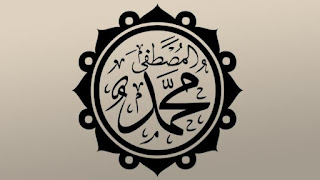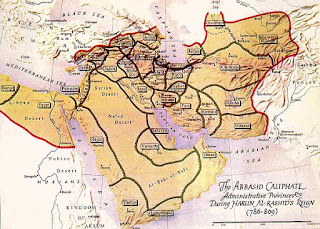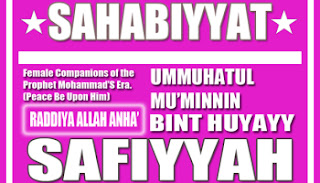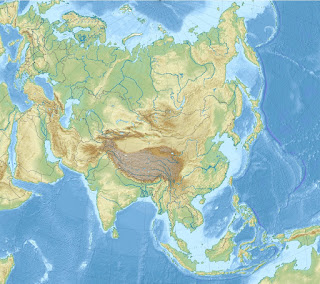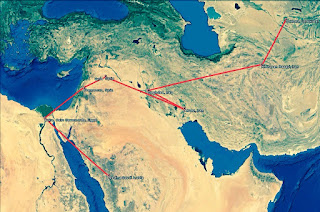Solomon inherited David's prophethood and dominion. This was not a material inheritance, as prophets do not bequeath their property. It is given away to the poor and needy, not to their relatives. Prophet Muhammad (pbuh) said: "The prophets' property will not be inherited, and whatever we leave is to be used for charity." (Sahih Al-Bukhari).
And indeed We gave knowledge to David and Solomon, and they both said: "All the praises and thanks be to Allah, Who has preferred us above many of His believing slaves!"
And Solomon inherited (the knowledge of) David. He said: "O mankind! We have been taught the language of birds, and on us have been bestowed all things. This, verily, is an evident grace (from Allah)."
And there were gathered before Solomon his hosts of jinns and men, and birds, and they were all set in battle order (marching forwards). (Ch 27:15-17 Quran).
After his father's death, Solomon became king. He begged Allah for a kingdom such as none after him would have, and Allah granted his wish. Besides wisdom, Allah had blessed Solomon with many abilities. He could command the winds and understand and talk to birds and animals. Allah directed him to teach both men and jinns to mine the earth and extract its minerals to make tools and weapons. He also favored him with a mine of copper, which was a rare metal in those days.
During his time horses were the common mode of transportation. They were very essential for defense, to carry soldiers and cart provisions and weapons of war. The animals were well cared for and well trained. One day Solomon was reviewing a parade of his stable. The fitness, beauty and posture of the horses fascinated him so much that he kept on stroking and admiring them. The sun was nearly setting, and the time for the middle prayer was passing by. When he realized this, he exclaimed: "I surely love the finer things of life than the service of my Lord! Return them to me."
Almighty Allah revealed: And to David We gave Solomon. How excellent a slave! Verily, he was ever oft returning in repentance (to Us)!
When there were displayed before him, in the afternoon, well-trained horses of the highest breed (for jihad in Allah's cause). And he said: "Alas! I did love the good (these horses) instead of remembering my Lord (in my 'Asr prayer)" till the time was over, and the sun had hidden in the veil of the night. Then he said: "Bring them (horses) back to me." Then he began to pass his hand over their legs and their necks (till the end of the display).
And indeed We did try Solomon and We placed on his throne Jasadan (a devil, so he lost his kingdom for a while) but he did return (to his throne and kingdom by the Grace of Allah and he did return) to Allah with obedience and in repentance. He said: "My Lord! Forgive me, and bestow upon me a kingdom such as shall not belong to any other after me. Verily, You are the Bestower."
So, We subjected to him the wind, it blew gently to his order whithersoever he willed, and also the devils from the jinns including every kind of builder and diver, and also other bound in fetters. (Saying of Allah to Solomon): "This is Our gift, so spend you or withhold, no account will be asked." And verily, he enjoyed a near access to Us, and a good final return Paradise. (Ch38:30-40 Quran).
One day Solomon gathered his army, which had different battalions of men, jinns, birds, and animals. He marched them to the country of Askalon.
While they were passing through a valley, an ant saw the approaching army and cried out to warn the other ants: "Run to your homes! Otherwise, unaware, Solomon and his army might crush you!" Solomon, hearing the cry of the ant, smiled. He was glad that the ant knew him to be a prophet who would not intentionally harm Allah's creation. He thanked Allah for saving the ants' lives.
Allah the Almighty narrated: And there were gathered before Solomon his hosts of jinns and men, and birds, and they all were set in battle order (marching forwards). Till, when they came to a valley of the ants, one of the ants said: "O ants! Enter your dwellings, lest Solomon and his hosts crush you, while they perceive not."
So he (Solomon) smiled, amused at her speech and said: "My Lord! Inspire and bestow upon me the power and ability that I maybe grateful for Your Favors which You have bestowed on me and on my parents, and that I may do righteous good deeds that will please You, and admit me by Your Mercy among Your righteous slaves." (Ch 27:17-19 Quran).
In Jerusalem, on a huge rock, Solomon built a beautiful temple to draw the people to worship Allah. Today this building is known as "The Dome of the Rock." From there, a large band of followers joined Solomon on pilgrimage to the Holy Mosque in Mecca. After they had completed their hajj, they traveled to Yemen and arrived in the city of San'a. Solomon was impressed by their clever method of channeling water all over their cities. He was keen to build similar water systems in his own country but did not have enough springs.
He set out to find the hoopoe bird, which could detect water under the ground. He sent signals all over the hoopoe to call on him, but it was nowhere to be found. In anger, he declared that unless the bird had a good reason for its absence, he would punish it severely.
The hoopoe eventually came to Solomon and explained the reason for its delay. "I have discovered something of which you are not aware. I have come from Sheba (Sab'a) with important news." Solomon became curious, and his anger subsided. The bird continued: "Sab'a is ruled by a queen named Bilkis (Bilqis), who has plenty of everything, including a splendid throne. But in spite of all this wealth, Satan has entered her heart and the hearts of her people. She rules their minds completely. I was shocked to learn that they worship the sun instead of Allah the Almighty."
To check the hoopoe's information, Solomon sent a letter to the queen with the bird. He instructed the bird to remain hidden and to watch everything.
The hoopoe dropped the letter in front of the queen and flew away to hide. She excitedly opened and read it: "Verily! It is from Solomon, and verily! It reads: 'In the Name of Allah, the Most Beneficent, and Most Merciful; be you not exalted against me, but come to me as Muslims (true believers who submit with full submission).'" ( Ch 27:30-31 Quran).
The queen was very disturbed and hurriedly summoned her advisors. They reacted as to a challenge, for they felt that there was someone challenging them, hinting at war and defeat, and asking them to submit to his conditions.
They told her that they could only offer advice, but it was her right to command action. She sensed that they wanted to meet Solomon's invasion threat with a battle. However, she told them: "Peace and friendship are better and wiser; war only brings humiliation, enslaves people and destroys the good things. I have decided to send gifts to Solomon, selected from our most precious treasure. The courtiers who will deliver the gifts will also have an opportunity to learn about Solomon and his military mighty."
Solomon's reconnaissance team brought him the news of the arrival of Bilkis' messengers with a gift. He immediately realized that the queen had sent her men on a probing mission thus, he gave orders to rally the army. The envoys of Bilqis, entering amidst the well-equipped army, realized that their wealth was nothing in comparison to that of the kingdom of Solomon's palace floors, which were made of sandalwood and inlaid with gold.
They noticed Solomon surveying his army, and they were surprised at the number and variety of soldiers, which included lions, tigers, and birds. The messengers stood in amazement, realizing that they were in front of an irresistible army.
The envoys marveled at the splendor surrounding them. They eagerly presented their queen's precious gifts and told Solomon that the queen wished that he would accept them as an act of friendship. They were shocked by his reaction: he did not even ask to open the covers of the containers! He told them: "Allah hagiven me plenty of wealth, a large kingdom, and prophethood. I am, therefore, beyond bribery. My only objective is to spread the belief in Tawheed, the Oneness of Allah."
He also directed them to take back the gifts to the queen and to tell her that if she did not stop her kind of worship he would uproot her kingdom and drive its people out of the land.
The queen's envoys returned with the gifts and delivered the message. They also told her of the wonderful things they had seen. Instead of taking offense, she decided to visit Solomon. Accompanied by her royal officials and servants, she left Sheba, sending a messenger ahead to inform Solomon that she was on her way to meet him.
Solomon asked the jinns in his employ whether anyone among them could bring her throne to he palace before she arrived. One of them said; "I will bring it to you before this sitting is over." Solomon did not react to this offer; it appeared that he was waiting for a faster means. The jinns competed with each other to please him. One of them named Ifrit said: "I will fetch it for you in the twinkling of an eye!"
No sooner had this one - who had the knowledge of the Book - finished his phrase than the throne stood before Solomon. The mission had, indeed, been completed in the blinking of an eye. Solomon's seat was in Palestine, and the throne of Bilqis had been in Yemen, two thousand miles away. This was a great miracle performed by one of those sitting with Solomon.
When Bilqis arrived at Solomon's palace, she was welcomed with pomp and ceremony. Then, pointing to the altered throne, Solomon asked her whether her throne looked like that one. She looked at it again and again. In her mind she was convinced that her throne could not possibly be the one she was looking at, as hers was in her palace; et, she detected a striking similarity and replied: "It is as if it were the very one, and resembles mine in every respect." Solomon judged that she was intelligent and diplomatic.
He then invited her into the great hall, the floor of which was laid in glass and shimmering. Thinking it was water, as she stepped on the floor, she lifted her skirt slightly above her heels, for fear of wetting it. Solomon pointed out to her that it was made of solid glass.
She was amazed. She had never seen such things before. Bilqis realized that she was in the company of a very knowledgeable person who was not only a ruler of a great kingdom but a messenger of Allah, as well. She repented, gave up sun worship, accepted the faith of Allah, and asked her people to do the same.
It was finished; Bilqis saw her people's creed fall apart before Solomon. She realized that the sun which her people worshipped was nothing but one of Allah's creatures.
The sun eclipsed within her for the first time, and her heart was lit by a never fading light, the light of Islam. Almighty Allah told us this story in the Quran: He inspected the birds, and said: "What is the matter that I see not a hoopoe? Or is he among the absentees? I will surely punish him with a severe torment, or slaughter him, unless he brings me a clear reason."
But the hoopoe stayed not long, he came up and said: "I have grasped (the knowledge of a thing) which you have not grasped and I have come to you from Sheba with true news. I found a woman ruling over them, and she has been given all things that could be possessed by any ruler of the earth, and she has a great throne. I found her and her people worshipping the sun instead of Allah, and Satan has made their deeds fair seeming to them, and has barred them from Allah's Way, so they have no guidance."
Al-La (this word has two interpretations) [As Satan has barred them from Allah's Way} so that they do not worship (prostrate before) Allah, or so that they may worship (prostrate before) Allah, Who brings light to what is hidden in the heavens and the earth, and knows what you conceal and what you reveal. Allah, La ilaha illa Huwa (none has the right to be worshipped but He), the Lord of the Supreme Throne!
(Solomon) said: "We shall see whether you speak the truth or you are one of the liars. Go with this letter of mine, and deliver it to them, then draw back from them, and see what answer they return."
She said: "O chiefs! Verily! Here is a delivered to me a noble letter. Verily! It is from Solomon and verily! It (reads): 'In the Name of Allah, the Most Beneficent, the Most Merciful; Be you not exalted against me, but come to me as Muslims (true believers who submit to Allah with full submission)."
She said: "O chiefs! Advise me in this case of mine. I decide no case till you are present with me."
They said: "We have great strength, and great ability for war, but it is for you to command; so think over what you will command."
She said: "Verily! Kings, when they enter a town (country), they despoil it, and make the most honorable amongst its people low. And thus they do. But verily! I am going to send him a present, and see with what answer the messengers return."
So when (the messengers with the present) came to Solomon, he said: "Will you help me in wealth? What Allah has given me is better than that which He has given you! Nay, you rejoice in your gift!" (Then Solomon said to the chief of her messengers who brought the present): "Go back to them. We verily shall come to them with hosts that they cannot resist, and we shall drive them out from there is disgrace, and they will be abased."
He said: "O chiefs! Which of you can bring me her throne before they come to me surrendering themselves in obedience?"
An Ifrit (strong) from the jinns said: "I will bring it to you before you rise from your place (council). And verily, I am indeed strong, and trustworthy for such work."
One with whom was knowledge of the Scripture said: "I will bring it to you within the twinkling of an eye!" then when Solomon saw it placed before him, he said: "This is by the Grace of my Lord, to test me whether I am grateful or ungrateful! And whoever is grateful, truly, his gratitude is for the good of his ownself, and whoever is ungrateful, he is ungrateful only for the loss of his ownself. Certainly! My Lord is Rich (Free of all wants), Bountiful!"
He said: "Disguise her throne for her that we may see whether she will be guided (to recognize her throne), or she will be one of those not guided."
So when she came, it was said to her: "Is your throne like this?"
She said: "It is as though it was the very same."
And Solomon said: "Knowledge was bestowed on us before her, and we were submitted to Allah (in Islam as Muslims before her)."
And that which she used to worship besides Allah has prevented her from Islam, for she was of a disbelieving people.
It was said to her: "Enter As-Sarh" (a glass surface with water underneath it) or a palace, but when she saw it, she thought it was a pool, and she tucked up her clothes, uncovering her legs.
Solomon said: "Verily, it is Sarh paved smooth with slab of glass."
She said: "My Lord! Verily, I have wronged myself, and I submit (in Islam), together with Solomon, to Allah, the Lord of the Alamin (mankind, jinns, and all that exists)." (Ch 27:20-44 Quran)
Solomon's public work was largely carried out by the jinns. This was a punishment for their sins of making people believe that they were all-powerful, knew the unseen, and could foresee the future. As a prophet, it was Solomon's duty to remove such false beliefs from his followers.
Solomon lived amidst glory, and all creatures were subjected to him. Then Allah the Exalted ordained for him to die. His life and death were full of wonders and miracles; thus, his death harmonized with his life and glory. His death, like his life, was unique. The people had to learn that the future is known neither by the jinns, nor by the prophets, but by Allah alone. Solomon's effort in this direction did not end with his life, for even his death became an example. He was sitting holding his staff, overseeing the jinns at work in a mine. He died sitting in this position. For a long time no one was aware of his death, for he was seen sitting erect. The jinns continued with their sand toil, thinking that Solomon was watching over them.
Many days later, a hungry ant began nibbling Solomon's staff. It continued to do so, eating the lower part of the staff, until it fell out of Solomon's hand, and his great body fell to the ground. People hurried to him, realizing that he had died a long time ago and that the jinns did not perceive the unseen, for had the jinns known the unseen, they would not have kept working, thinking that Solomon was alive.
Allah the Exalted revealed: And We caused a fount of molten brass to flow for him, and there were jinns that worked in front of him by the Leave of his Lord, and whosoever of them turned aside from Our Command, We shall cause him to taste of the torment of the blazing Fire.
They worked for him what he desired, (making) high rooms, images, basins as large as reservoirs, and (making) cauldrons fixed (in their places). "Work you, O family of David, with thanks!" But few of My slaves are grateful.
Then when we decreed death for him (Solomon), nothing informed them (jinns) of his death except a little worm of the earth, which kept slowly gnawing away at his stick, so when he fell down, the jinns saw clearly that if they had known the unseen, they would not have stayed in the humiliating torment. (Ch 34:12-14 Quran).
Source : http://www.islamawareness.net/Prophets/sulaiman.html


